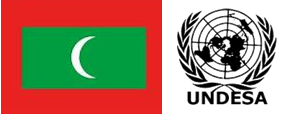Member States, UN agencies and international organizations reviewed progress of partnerships and initiatives launched at the third International Conference on Small Islands Developing States (SIDS).
The informal SIDS Partnership Dialogue, organized by Maldives and UN-DESA as a follow-up to the Conference, took place on 25 June 2015 in New York, US.
 25 June 2015: UN Member States, UN agencies and international organizations reviewed progress of partnerships and initiatives launched at the Third International Conference on Small Island Developing States (SIDS). The informal SIDS Partnership Dialogue, organized by Maldives and the UN Department of Economic and Social Affairs (DESA) as a follow-up to the Conference, took place on 25 June 2015, in New York, US.
25 June 2015: UN Member States, UN agencies and international organizations reviewed progress of partnerships and initiatives launched at the Third International Conference on Small Island Developing States (SIDS). The informal SIDS Partnership Dialogue, organized by Maldives and the UN Department of Economic and Social Affairs (DESA) as a follow-up to the Conference, took place on 25 June 2015, in New York, US.
Nikhil Chandavarkar, Division for Sustainable Development, UN DESA, briefed participants on the draft recommendations for a SIDS Partnership Framework, which is a result of a consultative process with Member States and other relevant stakeholders and seeks to monitor and ensure the full implementation of SIDS partnerships.
The six draft recommendations for the Partnership Framework are: forming an informal steering group to guide follow-up activities on SIDS partnerships; organizing an annual informal Multi-stakeholder SIDS Partnership Dialogue on the margins of the meetings of the High-level Political Forum on Sustainable Development (HLPF); organizing Regional Multi-stakeholder SIDS Partnership Dialogues through existing fora, such as the Economic and Social Council (ECOSOC) Regional Commissions, in collaboration with SIDS and partners to develop regional progress reports to be presented at the HLPF Partnership Dialogue; encouraging the organization of National Multi-stakeholder SIDS Partnership Dialogues; developing a standardized reporting mechanism for partnership progress reports; and continuing to further develop the SIDS Action Platform to ensure its simplicity and relevance to the process, while keeping it open for new registrations of SIDS-specific partnerships.
Taking the floor, Member States urged the UN Secretariat to work in a coordinated manner, stressing that “the relationship between the Secretariat and Member States is the most important partnership in making the SIDS Partnership Framework and the follow-up process to the Samoa Pathway a great success.” On the recommendation to form an informal steering committee to guide the follow-up process of partnerships, some delegates stressed the need to look at existing groupings, such as the Friends of LDCs, and work within existing resources.
During the ensuing discussion, participants discussed progress on partnerships. The United Arab Emirates (UAE) reported that, since 2013, its renewable programme has invested US$700 million in grants and soft loans, including the Pacific Partnership Fund, with 11 Pacific projects that will create US$3.5 million of savings in the energy sector.
The UN Environment Programme (UNEP) mentioned: the Sustainable Consumption and Production for SIDS Initiative; work undertaken with Barbados, Bahamas, Jamaica and others to advance energy efficiency in tourism economies to reduce fossil fuel dependency; and its collaboration with the Regional Seas Conventions and Action Plans (RSCAP) through a Global Coral Reef Partnership on building resilience to climate change.
The Australia International Trade Centre (ITC) spoke of three partnerships related to ‘Women & Trade – Economic Empowerment of Women in the Pacific,’ launched in 2014 in the Pacific region.
The US referred to a workshop organized with the International Renewable Energy Agency (IRENA) in Hawaii, US, for Pacific countries on energy efficiency. He also mentioned: the International Diaspora Alliance; the Caribbean Energy Security Initiative; the funding of a 20 megawatt solar farm in Jamaica; and the provision of a 20 million project finance facility for Caribbean countries.
Singapore reported that it trained nearly 8000 SIDS officials under the Secretariat of the Pacific Community (SPC) programme to improve governance. Sweden contributed US$500 million to the Green Climate Fund (GCF), the Global Environment Facility (GEF), and other funds.
The UN Capital Development Fund (UNCDF) referred to the Pacific Financial Inclusion Programme, explaining that it will now move to its second phase. The World Bank Group spoke about the Caribbean Catastrophe Risk Facility, which has 16 members and partners and is supported by the Governments of France, Japan, the UK and the EU.
In closing, Ambassador Ahmed Sareer, Permanent Representative of Maldives to the UN, said SIDS welcome the forging of new partnerships for sustainable development. He added that a robust review and follow-up mechanism of SIDS partnerships needs to be underpinned by data collection and data analysis in order for SIDS partnerships to tell their story through facts.
The Third International Conference on SIDS was held in 2014 in Apia, Samoa. [SIDS Partnership Dialogue Summary and Progress Report] [SIDS Partnership Framework] [IISD RS Coverage of the Third International Conference on SIDS]